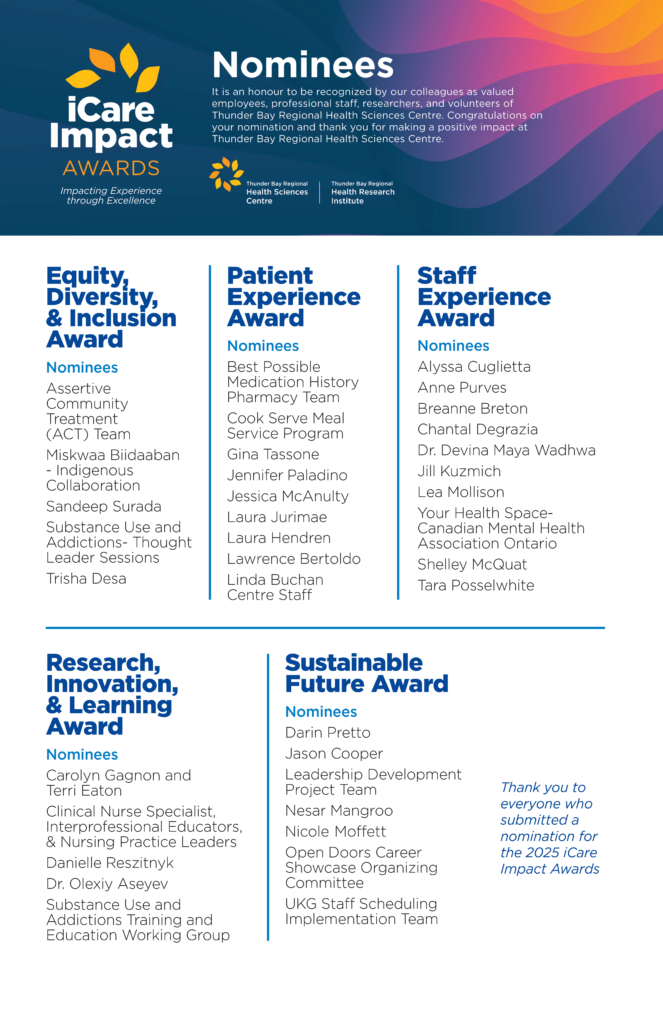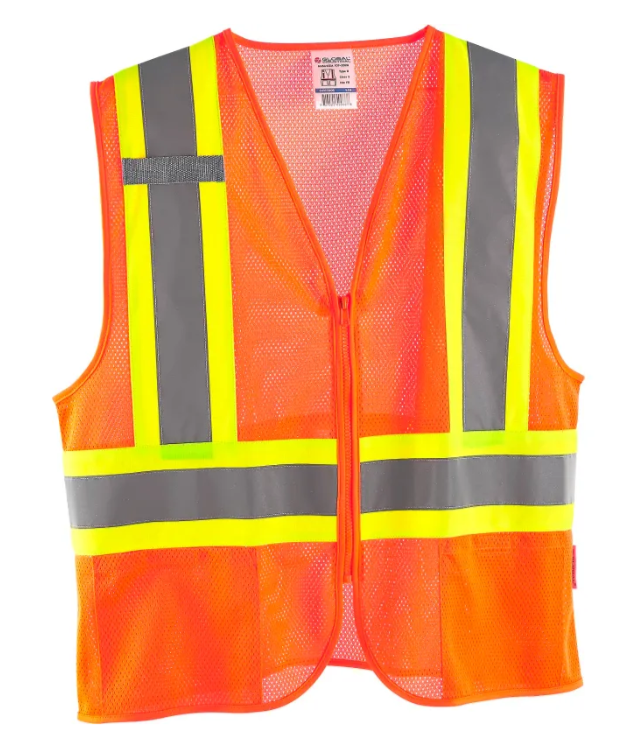Shared on behalf of Thunder Bay Counselling and the Occupational Health and Safety Department
Solutions Newsletter – January 2026


Shared on behalf of Thunder Bay Counselling and the Occupational Health and Safety Department

The Holiday Hand Hygiene prize draw has been temporarily paused while the Infection Prevention and Control (IPAC) team addresses more urgent operational matters.
Hand hygiene remains a critical patient safety practice, and staff are reminded to continue following IPC-2-12 Effective Hand Hygiene policy, including:
Thank you for your continued commitment to excellent hand hygiene. Updates on the prize draw will be shared once it resumes.

Nominees are submitted by their peers to honour their hard work and dedication to providing Exceptional care for every patient, every time!
Here is what each category stands for:
Strategy in Action Award (Senior Leadership Council to select and the Board of Directors to endorse)
Awarded to a team or initiative, which has contributed to a strategic project and/or initiative that made an impact on the patient and/or staff experience at TBRHSC.
Vision Award (Senior Leadership Council to select and the Board of Directors to endorse)
Awarded an individual or team who has contributed to our vision of exceptional care for every patient, every time. This individual or team is an outstanding contributor to our mission and vision and consistently exemplifies our values.
Equity, Diversity, and Inclusion Award
Awarded to a member or members of the hospital community who contributed to a strategic initiative that embodies the goal of “we all belong”. This individual or team embeds diversity in all they do and ensures the provision of a culturally safe experience to staff and/or patients.
Patient Experience Award
Awarded to a member or members of the hospital community who contributed to a strategic initiative that embodies the goal of “empathy, compassion and respect in every encounter”. This individual or team embeds empathy, compassion and respect into their interactions with others, is focused on quality, and is an expert in caring for patients with complex needs.
Staff Experience Award
Awarded to a member or members of the hospital community who contributed to a strategic initiative that embodies the goal of “this is where we want to work, grow and thrive”. This individual or team works diligently to ensure that staff experience a psychologically safe and just work culture, and supports the ongoing development of employees and leaders alike.
Research, Innovation, and Learning Award
Awarded to a member or members of the hospital community who contributed to a strategic initiative that embodies the goal of “prioritizing our research efforts”. This individual or team works to ensure that we support staff capacity and capability for research and success, and creates an environment supportive of research, innovation and learning.
Sustainable Future Award
Awarded to a member or members of the hospital community who contributed to a strategic initiative that embodies the goal of “ensuring our healthy future”. This individual or team embeds the principles of sustainability into their daily work and interactions with others.


What’s the purpose of the emergency code vest?
What’s an emergency code vest?

Who’s the vested designate?
Scenario Example: Code Green STAT



Shared on behalf of Adam Vinet, Vice President, Patient Experience, Chief Nursing Executive & RVP, Regional Cancer Care
Due to current capacity challenges at Thunder Bay Regional Health Sciences Centre, effective today until Monday, January 12, 2026, eight additional inpatient beds will be temporarily made available in the back section of the Surgical Day Care Unit, utilizing beds 40 through 47. On the admission census, these beds will be coded T 3ALC. Attached is a map with the location of the area highlighted.
In the case of an emergency, staff are instructed to identify the area as Surgical Day Care. In the event the unit needs to be called, the extension number is 6187. Staff are instructed to follow all Surgical Day Care response plans in the event of an emergency.
I would like to sincerely thank everyone for the rapid coordination and collaboration in organizing the opening of this temporary care space. Your flexibility and commitment are greatly appreciated and essential in ensuring continued safe patient care during this period of increased demand.
Please direct any operational questions or concerns to John Ross, Director of Surgical and Ambulatory Services, by email john.ross@tbh.net or by phone 807-630-1966.
Thank you again for your dedication and support.
Attachment: Surgical Day Care Short-Stay Unit (Overflow) Map

As we distribute the 2026 Well-Being Calendar across the organization, we would like to share an important clarification to prevent any confusion.
We have identified an incorrect listing of the Civic Holiday. Please note that the Civic Holiday is observed on Monday, August 3, 2026, not August 1, 2026 as currently shown in the calendar.
While we regret this error, reprinting the calendars is not feasible at this time. We kindly ask staff to make note of this correction when referencing the calendar, particularly for planning purposes.
For more information, please contact, Kimberly Myros at Kimberly.Myros@tbh.net.


Shared on behalf of Nicole Moffett, Manager Emergency Preparedness, Switchboard, Security
We would like to acknowledge the exceptional work by teams across the Hospital in supporting the Code Green Stat that was activated in 1C on morning of December 30.
Upon activation of the Code, staff swiftly responded to the unit to support safe movement of patients. Ultimately 13 Maternal Newborn patients were evacuated from the unit. The unit was then temporarily relocated to Surgical Daycare, where they remained until January 1, while Maternal Newborn cleanup and repairs occurred.
Multiple teams were involved in supporting response and continuity efforts, repeatedly demonstrating dedication to our vision of exceptional care for every patient, every time.
Thanks to your efforts, there was no harm to any patient, and no belongings were lost.

Shared on behalf of Infection Prevention and Control
Please be advised that the Influenza A outbreak has been declared OVER at TBRHSC, Forensics Inpatient Unit. All restrictions have been lifted.
Please share this information with the appropriate staff.
As always, our number one priority is the safety of patients and their families, staff and visitors. The department of Infection Prevention and Control encourages everyone to keep applying the routine practices of hand hygiene, proper use of PPE, equipment cleaning, and the appropriate admission screening of all patients. Please set an example for staff and students and assist us by maintaining compliance and due diligence.
For more information, contact Infection Prevention and Control at extension 6094.

The Maternity Centre at Thunder Bay Regional Health Sciences Centre (TBRHSC) provides prenatal care for the residents of Thunder Bay and surrounding region. Our team is committed to providing evidence-based maternity care that is safe, respectful and culturally sensitive.
Self-referral can be made to be seen by a Nurse Practitioner, Family Medicine Physician, Social Worker, Kinesiologist, Dietician, and Lactation Consultant.
To be seen by an Obstetrician, a referral is needed from your primary health care provider or midwife.
During pregnancy, you are welcome to call the Maternity Centre to schedule an appointment with one of our prenatal care providers. All of our programs are accessible with your Ontario health card.
TBRHSC’s Maternity Centre welcomes the 98 babies born at our Hospital during the month of December. Congratulations on the new bundles of joy!
Find out more about our services by visiting https://bit.ly/TBRHSC-Maternity-Centre-info
